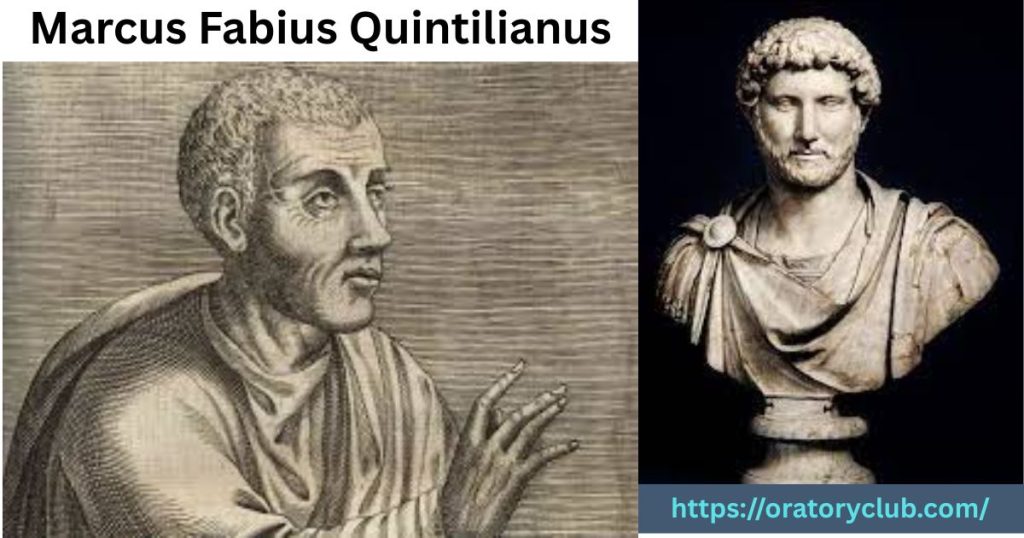All About Marcus Fabius Quintilianus: The Master of Rhetoric
Marcus Fabius Quintilianus, often referred to simply as Quintilian, was a towering figure in the realm of Roman rhetoric and education. Born around 35 AD in Calagurris (modern-day Calahorra, Spain), Quintilian’s legacy has had a profound influence on the study of oratory and education that reverberates through centuries. Known for his systematization of rhetoric and his dedication to educating orators, Quintilian’s ideas and methods continue to shape modern education and communication.
Early Life and Education
Quintilian’s early years were marked by the intellectual environment of his family. His father, a well-educated man, sent him to Rome to study rhetoric. During the early years of Nero’s reign, he studied under the guidance of prominent mentors, including Domitius Afer, a renowned lawyer and orator. Afer’s austere, classical style of speaking, rooted in the tradition of Cicero, would greatly influence Quintilian’s approach to oratory. This mentorship formed the foundation of Quintilian’s lifelong passion for teaching and perfecting the art of rhetoric.
After Afer’s death in 59 AD, Quintilian returned to Hispania, possibly to practice law in his native province. However, his return to Rome in 68 AD marked a new chapter in his career. He came to Rome as part of the entourage of Emperor Galba, Nero’s short-lived successor. Though Quintilian did not play a significant role in Galba’s court, the turbulent political climate that followed the Emperor’s assassination paved the way for Quintilian’s eventual success in establishing a public school of rhetoric.

Teaching Career and Achievements
During the chaotic “Year of the Four Emperors” in 69 AD, Quintilian founded his renowned school of rhetoric in Rome. His pedagogical approach attracted students from all over the empire, including the future famous authors Pliny the Younger and possibly Tacitus. Despite the political unrest surrounding the reigns of multiple emperors, Quintilian’s focus remained on the moral and intellectual development of his students.
Quintilian’s reputation as a teacher earned him significant recognition, including an appointment as consul under Emperor Vespasian. Vespasian, although not particularly interested in the arts, recognized the importance of education in creating an intelligent and responsible ruling class, and thus subsidized Quintilian’s school. This allowed Quintilian to dedicate more time to his teaching and mentoring, shaping the orators of tomorrow. Alongside his teaching career, Quintilian continued to practice law, often arguing cases in the Roman courts.
Quintilian’s personal life remains somewhat obscure, though he mentions in his writings that he had a wife who died young, and two sons who did not survive him. By 88 AD, after securing financial stability, Quintilian retired from both teaching and practicing law. He spent the remainder of his life as a man of leisure, though he still remained influential, even serving as the tutor to Emperor Domitian’s grand-nephews in 90 AD. Quintilian died around 100 AD, shortly after the assassination of Emperor Domitian.
Quintilian’s Works
The most significant legacy of Quintilian is his magnum opus, Institutio Oratoria (The Institutes of Oratory), a twelve-volume work that serves as both a comprehensive guide to the theory and practice of rhetoric and an educational treatise. Written in the final years of Domitian’s reign, Institutio Oratoria is a meticulous exploration of how orators should be trained, from their early years through adulthood. Quintilian advocates for a well-rounded education that nurtures not only the rhetorical skills but also the moral character of an orator. According to Quintilian, a true orator must first be a good person—one who is just, honorable, and dedicated to the welfare of society. His famous “vir bonus, dicendi peritus”—the good man skilled in speaking—captures his central belief that morality and eloquence must go hand in hand.
Quintilian’s work also delves into the practical aspects of rhetoric, covering a wide range of topics such as the art of persuasion, the use of figures of speech, and the importance of education in shaping effective communicators. His writing, grounded in the traditions of Cicero and Plato, emphasizes that rhetoric should serve the public good and promote justice.
In addition to Institutio Oratoria, Quintilian is also attributed with writing two sets of declamations, Declamationes Maiores and Declamationes Minores, which are thought to be examples of rhetorical exercises, though their authorship has been debated among scholars. These texts likely served as teaching tools to illustrate rhetorical techniques and hone the skills of Quintilian’s students.
Quintilian’s Influence and Legacy
Quintilian’s influence extended far beyond the confines of the Roman Empire, shaping education and rhetoric for centuries. He was one of the few Roman rhetoricians who made a deliberate effort to blend rhetorical theory with moral philosophy. His ideal orator was not just a master of language, but someone who used their skills to advance justice and contribute to society’s welfare.
During the Middle Ages, knowledge of Quintilian’s work was somewhat limited, but the Italian Renaissance sparked a revival of his teachings. In 1416, the humanist scholar Poggio Bracciolini rediscovered a complete manuscript of Institutio Oratoria in the Abbey of Saint Gall, reigniting interest in Quintilian’s ideas. Humanists such as Petrarch and Erasmus championed Quintilian’s views, with Erasmus particularly praising his educational philosophy. Quintilian’s emphasis on a well-rounded, child-centered education was especially influential in shaping modern pedagogical thought.
In the 16th and 17th centuries, Quintilian’s work continued to inspire notable figures, including Martin Luther, who lauded Quintilian’s approach to education and eloquence. The poet Alexander Pope also acknowledged Quintilian’s contributions in his Essay on Criticism, reinforcing the importance of his ideas in shaping literary criticism.
Quintilian’s work continues to resonate today. His Institutio Oratoria is still a key text in the study of rhetoric, oratory, and education, influencing contemporary views on public speaking and communication. Scholars of rhetoric, as well as educators in fields ranging from law to politics, find Quintilian’s teachings to be a source of wisdom and guidance on how to shape both the character and skill of the modern orator.
Conclusion
Marcus Fabius Quintilianus was not only a brilliant rhetorician but also a visionary educator who sought to elevate both the intellectual and moral character of those who would go on to influence society through their speeches. His legacy endures through his works, especially Institutio Oratoria, which remains an essential text for students and practitioners of rhetoric. Quintilian’s belief that the orator must first be a good person continues to offer valuable lessons for today’s speakers, reminding us that eloquence should serve a higher purpose—promoting truth, justice, and the common good.


